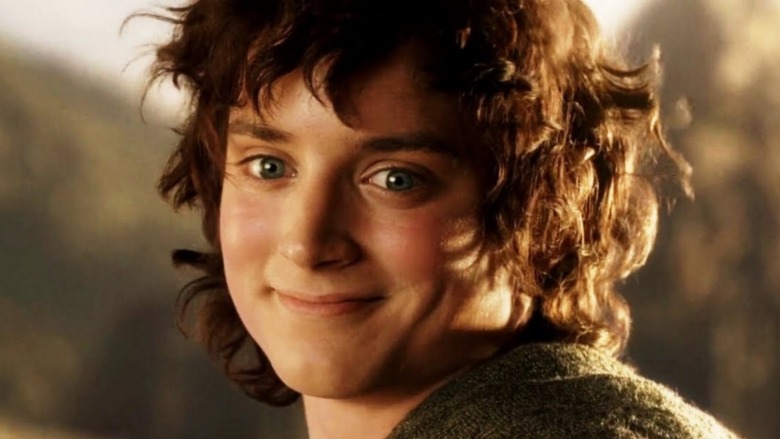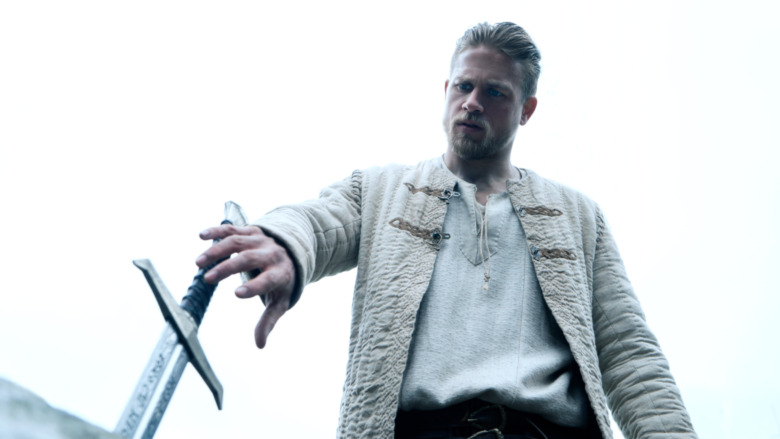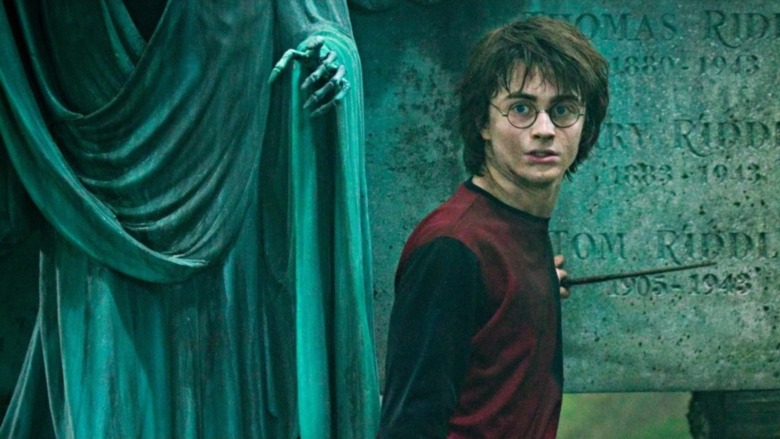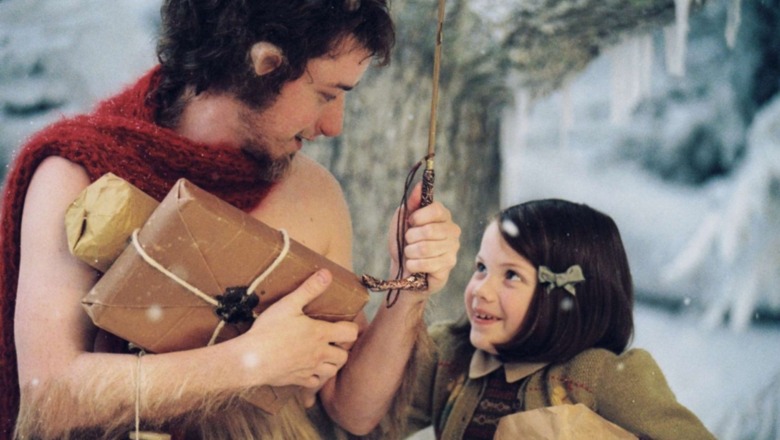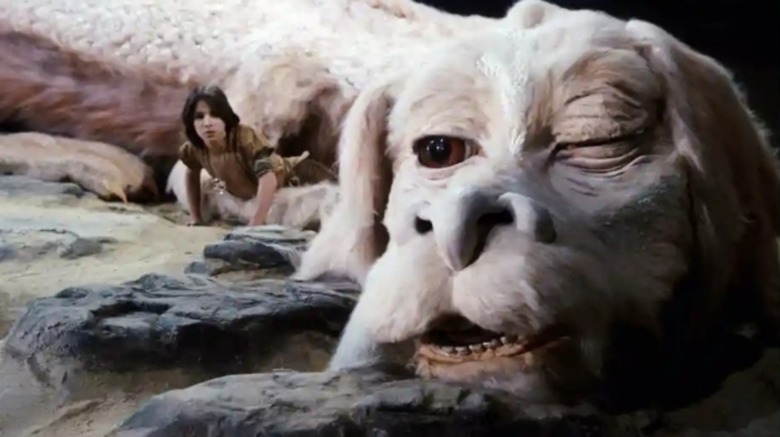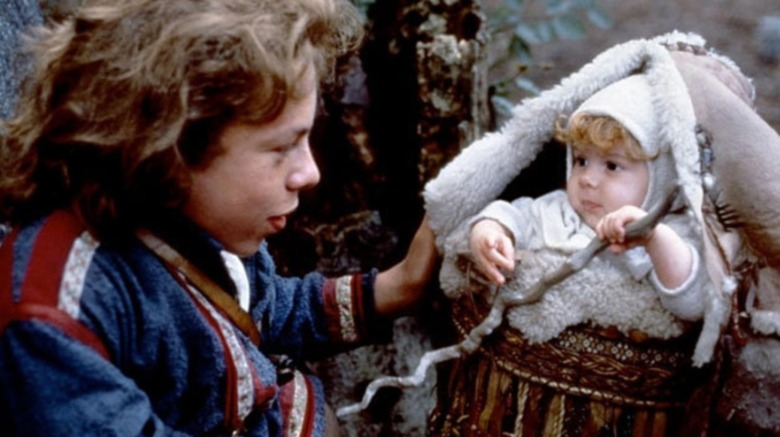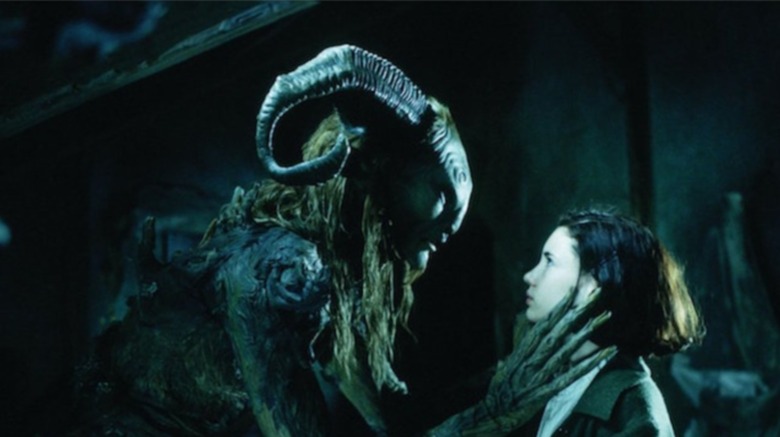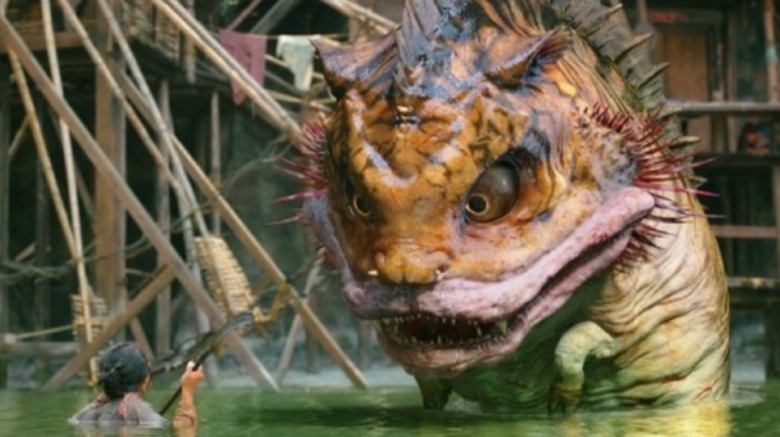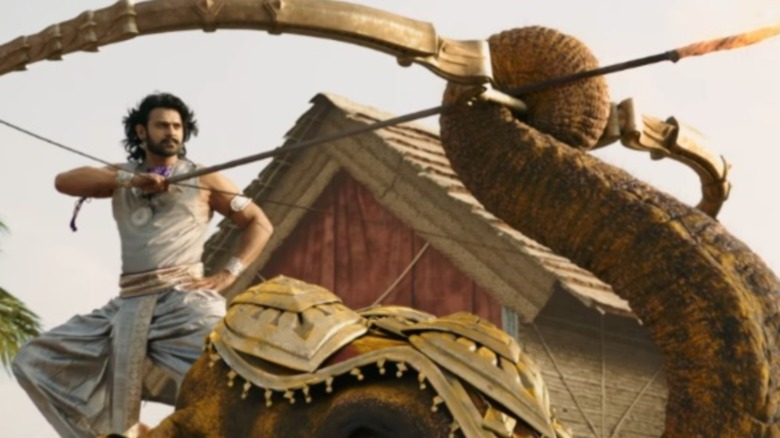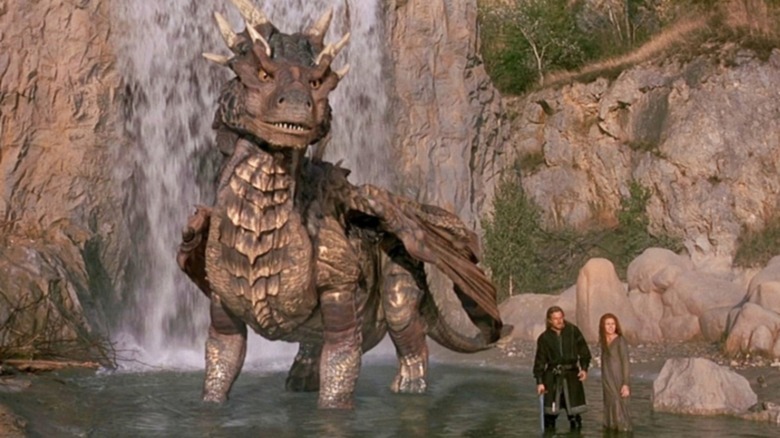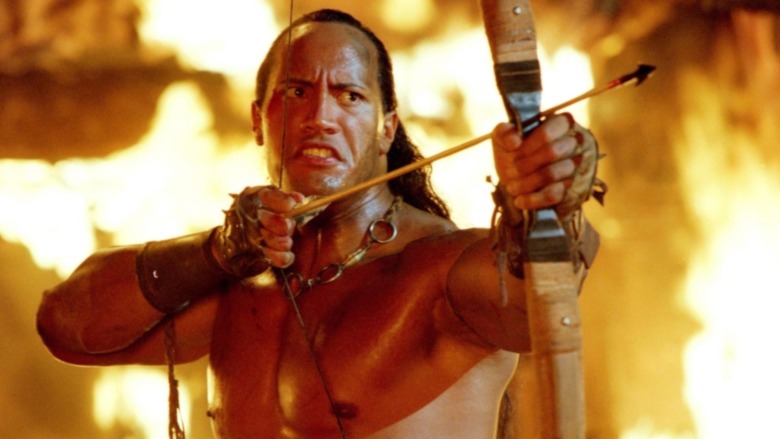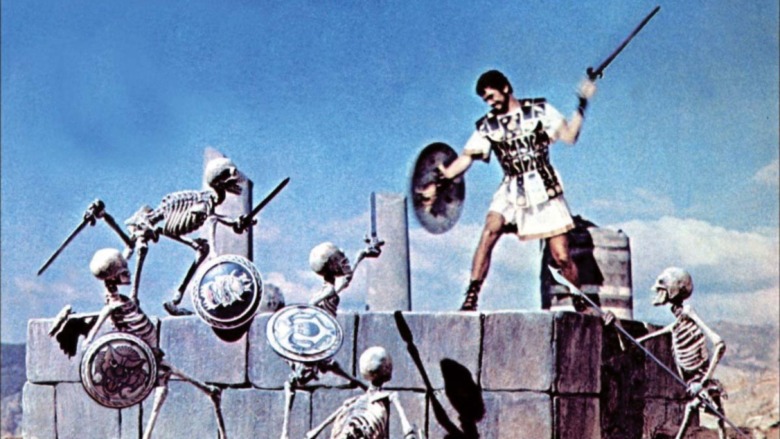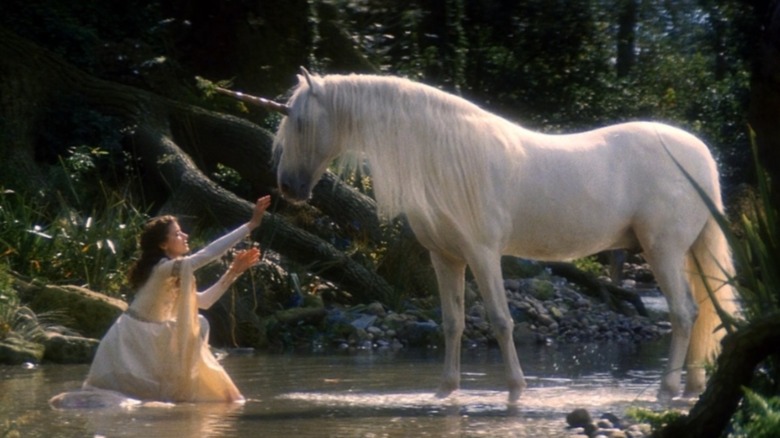12 Movies Like The Lord Of The Rings Fantasy Fans Have To See
Few writers manage to have an impact on an entire genre of fiction to the extent that J. R. R. Tolkien has had with his The Lord of the Rings series. The books are widely considered the gold standard for stories involving high fantasy. Tolkien was not the first storyteller to write about wizards and knights and epic missions to save an ancient world, but his work has come to codify an entire subsection of literature that has grown and evolved massively over time.
In the 2000s, after several previous attempts to adapt The Lord of the Rings for the big screen that were less successful, filmmaker Peter Jackson offered the world his cinematic vision for The Lord of the Rings movie trilogy. Finally, there was a film version of Tolkien's written words that was as epic in scope and grand in scale as the writer had envisioned in his novels.
Much like Tolkien boosted the popularity of fantasy books, Jackson's films have given a massive boost in popularity to the fantasy genre on the screen. There are a number of noted filmmakers all over the world who have put their own spin on the genre, with impressive results. Here are 12 options for fantasy movie fans looking to get lost in new worlds of epic magic and intrigue.
King Arthur: Legend of the Sword (2017)
While writing his novels, Tolkien himself was inspired by Arthurian legends and tales of the Knights of the Round Table that had existed for centuries prior. The character of Aragorn and his preoccupation with his ancestral sword Andúril clearly mirrors the journey that King Arthur embarks upon to retrieve the sword Excalibur and claim his kingdom.
In 2017, Guy Ritchie put his trademark style to use crafting a new spin on the Arthurian legends with King Arthur: Legend of the Sword. Charlie Hunnam stars in the lead as Arthur, son of Uther, the would-be king who must find a way to oust his scheming uncle from the throne and reclaim his birthright as the King of England.
While the movie is more grounded than The Lord of the Rings, it features plenty of magical elements, from demon knights to giant snakes from other realms. At the center of the whole thing is Excalibur, the sword that can make Arthur the new king in place of his uncle. This is far from the first movie to adapt the story of King Arthur for the big screen, but Ritchie's trademark flashy style of direction, well-constructed CGI visuals, and talented cast of actors make it a standout on the list.
The Harry Potter Series (2001-2011)
There's a reason why the Harry Potter books and movies are often compared to The Lord of the Rings. In a lot of ways, it feels like the world created by J.K. Rowling is a modern version of Tolkien's Middle-earth, where the use of magic has become much more regulated, and faerie creatures live in secret alongside humanity.
Despite the similarities, the Harry Potter saga stands on its own with a fascinating cast of characters, magic, and intrigue. Much like Frodo Baggins, Harry Potter starts out as an ordinary person, who is then tasked with the responsibility of saving the world through the use of magic that he does not fully understand. The movies that adapted Harry Potter for the big screen made some changes to the narrative of the books, but still managed to retain the sense of childlike wonder that the books captured so well.
The eight films in the franchise take the audience along with Daniel Radcliffe in the role of Harry Potter on a journey of discovery and growth, even if showcasing that growth was not always a welcome experience for Radcliffe. As the series progresses, in a true hero's journey, Harry comes to realize that the safety afforded to him as a student of Hogwarts cannot last. It is his destiny to take a stand against the evil Lord Voldemort, armed only with knowledge and the friendships he has gained along the way.
The Chronicles Of Narnia: The Lion, The Witch, And The Wardrobe (2005)
Before Harry Potter came along, C.S. Lewis' The Chronicles of Narnia series were the most famous children's fantasy novels. Lewis himself was friends with Tolkien, and the two held detailed discussions about crafting their own takes on the fantasy genre.
In 2005, the first Narnia novel was provided a new big-screen adaptation with The Chronicles of Narnia: The Lion, the Witch, and the Wardrobe. The film saw a group of isolated siblings discover a magical world hiding behind their cupboard. But this world, named Narnia, was not the cutesy, whimsical kind seen in Alice in Wonderland.
Instead, Narnia is a land under siege. Its king, the mighty lion Aslan, has disappeared. The lands have been overtaken by the evil White Witch. The children are seen as saviors of Narnia, fulfilling an ancient prophecy, but peace can only be won through war. Much like Frodo had to reach deep within himself to find the courage to go to Mordor, the children must set their fears aside and embark on a journey towards becoming true warriors.
The movie features gorgeous visuals that bring to life the magical world of Narnia ripped straight from the books. The franchise sputtered and sank at the box office with later installments, but The Lion, The Witch, and The Wardrobe has stood the test of time as a beautifully rendered, magical, and moving tale of innocence lost and regained.
The NeverEnding Story (1984)
There are few fantasy movies that have made a bigger impact on their genre than The NeverEnding Story. Even if you have never seen the film, chances are you have come across one of its scenes at some point on the internet. The NeverEnding Story was not a typical Hollywood cash grab. Making the movie was a passion project for famed German auteur filmmaker Wolfgang Petersen, and every frame of the movie carries his unorthodox imprint.
Loosely based on the 1979 novel of the same name by Michael Ende, The NeverEnding Story tells the tale of 10-year-old Bastian Bux, a book-loving introvert. Chancing upon a mysterious tome in his favorite bookstore, Bastian determines to read it against the advice of the store owner. Turning the pages of the book, Bastian is sucked into its world, entering the magical realm of Fantasia.
There he meets all manner of colorful and magical creatures and comes to learn of a prophecy that proclaims him as the chosen warrior, the one destined to save Fantasia from being engulfed in darkness at the hands of the evil entity known only as "The Nothing." At times bizarre, quixotic, and sad, The NeverEnding Story is ambitious in a way that few children's films attempt to be, which has only added to its longevity.
Willow (1998)
Before Frodo Baggins became everyone's go-to little guy for carrying out dangerous missions in a magical land, it was the titular character of 1988's Willow who held that position. Produced by George Lucas and directed by Ron Howard, Willow was Lucas's attempt to make a movie like Star Wars in the fantasy genre.
The film follows the story of Willow Ufgood (Warwick Davis), a Nelwyn dwarf who wants to become a sorcerer. Willow's life is turned upside down when he comes across a raft carrying a baby. The baby turns out to be Elora Danan, the foretold Princess of Tir Asleen. The evil sorceress Queen Bavmorda (Jean Marsh) wants to see the baby dead before it can be a threat to her reign. Willow takes it upon himself to get the baby safely back to its people.
Along the way, he encounters a host of dangers but also gets help from unexpected quarters as warriors, spirits, and a mercenary aid Willow and Elora on their journey. Apart from a talented cast and strong direction by Howard, Willow benefited from its association with Lucas, whose legendary VFX company Industrial Light & Magic provided state-of-the-art stop motion and CGI effects for the film that have stood the test of time very well.
Pan's Labyrinth (2006)
Before he won Oscars for Best Director and Best Picture for The Shape of Water, Guillermo del Toro signaled his arrival as a major filmmaker in the fantasy genre with the 2006 breakout hit Pan's Labyrinth.
Widely considered del Toro's best movie, Pan's Labyrinth introduces a character called Princess Moanna, whose father is King of the Underworld. Long ago, Moanna had ventured into the human world, where the blinding sunlight erased her memory and she lived out her life as a human before passing away. Believing she will one day return, her father builds a series of labyrinths around the world through which Moanna can come back to the underworld when the time comes.
In 1944 Francoist Spain, 10-year-old Ofelia encounters a fairy disguised as an insect. Believing Ofelia to be the reincarnation of Princess Moanna, the fairy leads the little girl into a stone labyrinth, where Ofelia is assigned three tasks that she has to complete for her to acquire immortality and return to the underworld. As Ofelia journeys deeper into the labyrinths on her quest, the magical world around her is brought to life in breathtaking fashion by del Toro's production design team, which won the film three Oscars for Best Cinematography, Art Direction, and Makeup.
Journey to the West: Conquering the Demons (2013)
China has one of the busiest film industries on the planet. Chinese action films have long been acknowledged as some of the best in the world, but the country also churns out hugely popular movies in other genres, including fantasy.
The Journey to the West franchise is the brainchild of actor/filmmaker Stephen Chow, best known to Western audiences for Shaolin Soccer and Kung Fu Hustle. Journey to the West: Conquering the Demons is a comedic reinterpretation of the classic sixteenth-century Chinese novel of the same name.
In the film, audiences meet demon hunters Xuan Zang and Miss Duan. While the former is a pacifist monk who believes demons can be trained by appealing to their better nature, Duan has a much more violent approach to demon-slaying. After a chance encounter, Duan falls in love with Xuan Zang due to his pacifist ideals, but he rejects her advances because he is intent on reaching nirvana through a monk's ascetic lifestyle.
Things are further complicated by the arrival of a formidable pig demon too powerful for either Xuan Zang or Duan to tame. In desperation, Xuan Zang seeks the legendary Monkey King, a mischievous deity who agrees to help them capture the pig demon, but with his own secret goals in mind. Filled with stunning visual imagery and Chow's inimitable style of physical comedy, Conquering the Demons is an excellent primer for anyone looking to dip their toes in Chinese fantasy films.
Bahubali: The Beginning (2015)
A smash hit in its native country of India, fantasy fans from other parts of the world did not give Baahubali: The Beginning the attention it deserved. Part King Arthur, part The Lord of the Rings, and deeply steeped in the ancient Indian texts of the Mahabharatha and Ramayana, the Bahubali franchise is one of the most ambitious fantasy movies attempted in the last two decades.
The first film in the two-part saga sees a mysterious child get washed up on the shore near a tribe in ancient India. The child is adopted by the tribe and named Shivu. Growing up to become a confident young man with extraordinary strength and skills, Shivu is obsessed with ascending a mountain summit near his village that is deemed unscalable by even the most experienced climbers.
After many attempts, Shivu is finally successful in climbing the mountain, and discovers a whole new world on the other side — including the mighty kingdom of Mahishmati, ruled by the cruel tyrant Bhalladeva. A chance encounter with General Katappa of the Mahishmati army reveals the fact that Shivu's birth name is Mahendra Baahubali, son of Amarendra Baahubali, the rightful king of Mahishmati. It now falls to Mahendra, Katappa, and their allies to wrest the kingdom away from Bhalladeva's forces.
Dragonheart (1996)
One of the strangest entries on this list, the 1996 British-American fantasy action-adventure film Dragonheart was a daring attempt to open up the limits of the fantasy genre. The film's star-studded team included Dennis Quaid and Sean Connery in the lead roles.
While many fantasy movies feature dragons that must be slain in order to complete the knight's quest, Dragonheart puts a different spin on the relationship between the two fantasy archetypes. Connery voices the dragon Draco, who saves a young prince's life by giving him half of his own heart. Unfortunately, the prince grows to become a cruel tyrant. One of his former knights, Bowen, played by Quaid, grows disillusioned with the new king's rule and becomes a lone dragon hunter. A chance meeting between Bowen and Draco leads to an unlikely partnership, as the two eke out a living by Draco first pretending to terrorize a village, and Bowen then pretending to slay him and pocketing the reward.
Unfortunately, the friendship that grows between the knight and the dragon is tested when the tyrant king orders Draco to be captured and the people of the surrounding village punished to quell a rebellion. Bowen must then make the difficult choice of helping the villagers or freeing Draco, whose life is inextricably linked to the king.
The Scorpion King (2002)
Although Brendan Fraser's The Mummy franchise led to diminishing returns with each new installment at the box office, its spinoff movie The Scorpion King proved just as funny, adventurous, and imaginative as the original The Mummy, aside from establishing WWE wrestling superstar Dwayne "The Rock" Johnson as a bona fide box office draw and the next big action star.
Set 5,000 years before the events of The Mummy, The Scorpion King tells the story of Mathayus, an Akkadian assassin who gets embroiled in a conspiracy orchestrated by King Memnon (Steven Brand) to extend his rule over all of Egypt and brutally subdue all the free tribes surrounding the area. Having lost his brother to Memnon's forces, Mathayus swears revenge against the king and abducts his chief sorceress Cassandra (Kelly Hu) to use as a bargaining chip. Upon discovering that Cassandra has also been held hostage by Memnon, Mathayus teams up with her and one of the last remaining free tribes to put an end to Memnon's reign in a thrilling finale.
Although The Scorpion King lacks as many of the magical elements as the rest of The Mummy franchise, the world it takes place in is just as exciting, with Johnson's broad shoulders more than capable of carrying the weight of the whole movie. His performance is as charismatic as his previous work inside the WWE ring, which made him a breakout star wrestler.
Jason and the Argonauts (1963)
If you're talking about high fantasy, you have to mention Greek mythology at some point, the primary inspiration for much of what we see in the fantasy genre today. Hollywood has made several attempts at adapting Greek legends for the big screen, and Jason and the Argonauts is one of the best entries on the list.
As the name suggests, the film is an adaptation of the travels of Jason and his crew of adventurers from the epic poem Argonautica. After the usurper Pelias takes over the throne of the kingdom of Thessaly by killing King Aristo, a prophecy foretells that Pelias will meet his end at the hands of a man with only one sandal. That man turns out to be Jason, who, unaware of his destiny, embarks on a mission to find the legendary Golden Fleece with a team of heroes that includes Hercules and the son of Pelias himself. The team meets with a number of adventures on their quest, as well as fearsome monsters and the invisible guiding hand of the Greek Gods themselves.
Made long before the advent of CGI, Jason and the Argonauts has been praised for its use of stop-motion animation to mesmerizing effect for the action scenes. The movie's impact on big-budget moviemaking can be felt to this day, and it served as an inspiration for many modern Hollywood blockbusters.
Legend (1985)
While sci-fi fans are aware of the impact of filmmaker Ridley Scott on the genre with the classic films Alien and Blade Runner, he has also been quite influential in the fantasy genre. Scott directed the 1985 epic dark fantasy adventure film Legend, starring Tom Cruise, Mia Sara, and Tim Curry in the lead roles.
The story takes place in a magical realm where the existence of unicorns keeps the world from descending into a wintry and eternal night. The romantic rendezvous of Princess Lili (Sara) with her forest-dwelling paramour Jack O'Greene (Cruise) gives the forces of the Lord of Darkness (Curry) the opportunity to seize the last remaining unicorn and sever its horn, plunging the world into darkness.
With the princess captured and the horn in the hands of the minions of the Lord of Darkness, Jack embarks on a mission to right the wrongs his actions have caused by rescuing Lili, retrieving the horn, and confronting the Lord of Darkness himself. Like any Ridley Scott classic, Legend is ambitious in scope and expansive in scale, with state-of-the-art effects and elaborate makeup and costuming that ably brings the darkly mystical world of the story to life.
